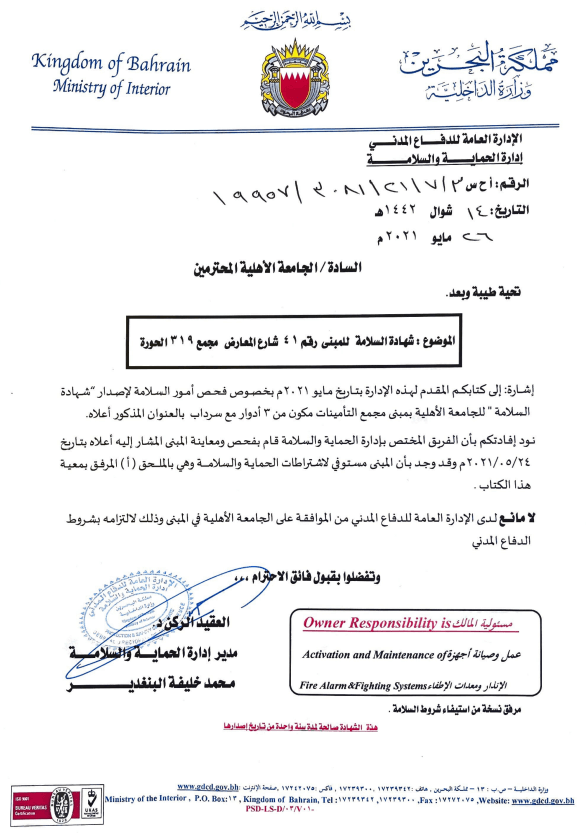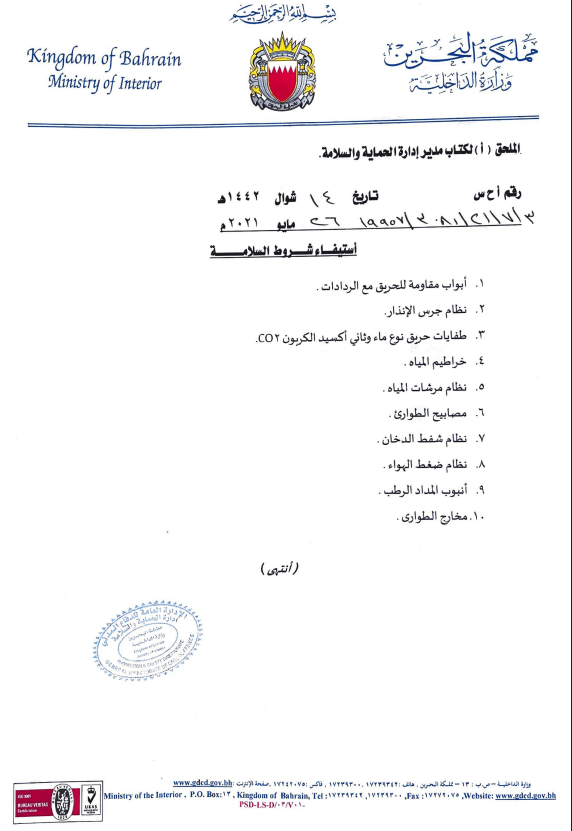
Goal 3 / 3.3 / 3.3.6
Does your university as a body have a 'smoke-free' policy?
SDG 3: GOOD HEALTH AND WELLBEING
Ahlia University firmly recognizes that the health and wellbeing of its community are fundamental pillars for achieving academic excellence, sustainable development, and social prosperity. In alignment with the United Nations Sustainable Development Goal 3 — Ensure healthy lives and promote wellbeing for all at all ages — the university has integrated health promotion, mental wellness, and preventive care as essential components of its institutional strategy. The university’s commitment extends beyond compliance with health and safety regulations; it seeks to foster a holistic environment that supports both physical and psychological wellbeing among students, faculty, and staff. Through its on-campus health clinic, continuous awareness campaigns, mental health counselling services, and partnerships with national health authorities, Ahlia University ensures accessible, inclusive, and high-quality health services for all members of its community. Moreover, AU actively promotes a culture of wellness through education, research, and community engagement. Health-related topics are embedded across various programs, encouraging students to develop a lifelong awareness of healthy lifestyles, social responsibility, and sustainability. By cultivating an environment where wellbeing is valued as a shared responsibility, Ahlia University contributes not only to SDG 3 but also to the broader vision of building a resilient and healthy society within the Kingdom of Bahrain and beyond.
3.3.6 Does your university as a body have a 'smoke-free' policy?
Smoke-Free Policy
In accordance with Bahrain’s national laws and our internal regulations, the **Student Handbook at Ahlia University declares the campus a non-smoking environment**. This regulation is embedded in the student code of conduct and the institution’s disciplinary policy, and it is communicated to all new students during orientation and in institutional literature.
Regulation
Ahlia University’s official regulations state that the campus adheres to civil safety norms and is designated as a **non-smoking campus**. This policy is integrated into campus operations (services, security, and maintenance) and applies equally to events and university activities. Ahlia University explicitly states that **smoking is prohibited in all university facilities**. This measure forms part of our commitment to ensuring a healthy, safe campus environment for the entire academic community. The policy applies to students, staff, contractors, and visitors, and is implemented through signage, internal communications, and disciplinary procedures in the event of violations.
Ahlia campus is accredited by civil defense safety regulations
Ahlia University considers health an important priority for building capacity for education. Student’s performance depends on their health conditions to study and excel in their courses. Within the premises of the University, Ahlia has already established the safety department to minimize the risk of health hazards and ensure the safety of students and employees. Alarm systems have been installed across the University campus and emergency medical boxes are provided in case of emergency. The Department of Physiotherapy has been heavily involved in a number of issues related to health not only to increase student awareness about the importance of health in the national development but also conducting research to identify some of the health problems commons in our society. To strengthen the University's capabilities in research, Ahlia faculty members have already established channels of cooperation and collaboration with both local and foreign universities and hospitals allowing knowledge transfer and information dissemination. Bahrain is promoting tourism and the mobility of people could always result in human contacts leading to the spread of diseases. Ahlia's future strategy is to support studies in health sciences in order to increase the countries' capabilities to improve health and strengthen the fundamentals for implementing Sustainable Development Goals. Mutual care is a philosophy that the University promotes, for several years, in the university community. Therefore, each initiative or decision of the Institution is designed to motivate the care of oneself, others and the environment. And the reception of this purpose is also evidenced by having a smoke-free campus that contributes to well-being.
The following table:


Figure 1: Ahlia campus is accredited by civil defense safety regulations
Kingdom of Bahrain Ministry of Health
As for the policy of protecting people from tobacco harm, which means the establishment of **completely smoke-free places in health-care and educational facilities** and in all indoor public places, including workplaces and restaurants, article 4 of the Anti-Smoking and Tobacco Act prohibits smoking in all closed public places, and article 8 prohibits the entry of persons under the age of 18 to places reserved for smokers, even if they are accompanied by their parents. In addition, judicial control has been granted to inspectors of the Department of Public Health, which empowers them to follow up on the implementation of the Anti-Smoking and Tobacco Act, control offenders and transfer them to the Public Prosecutor's Office to take the necessary legal action against them. A package of resolutions has also been adopted and issued, the most important of which is the issuance of resolution No. 2 for 2011 on the requirements to be met in places for in-restaurant smoking, Resolution 3 of 2011 on tobacco advertising and promotion controls and productions, and Resolution 58 of 2010 on the prohibition of the import of Indian milk, materials in its manufacture and similar materials. A proposal has been submitted by the National Anti-Smoking and Tobacco Commission to amend and update the Anti-Smoking and Tobacco Act and Resolution 2, the most prominent amendments will include stiffer penalties for violators and a proposal to repeal Section C of Article IV, which allows for the allocation of indoor smoking places so that they become completely tobacco-free.
Laws
- Law No. (8) of 2009 on the fight against smoking and tobacco of all kinds.
- Resolution No. (3) for 2011 on tobacco advertising and promotion controls and products.
- Resolution No. (58) of 2010 on the prohibition of the import of Indian dairy, manufacturing materials and similar materials.
- Resolution No. (21) for 2019 to reconstitute the National Committee against Smoking and Tobacco of all kinds and products.
- Resolution 2 of 2011 to issue requirements in restaurants, cafes and other shops that provide tobacco and its derivatives for smoking purposes.
Conventions
- WHO Framework Convention on Tobacco Control.
- WHO FRAMEWORK CONVENTION ON TOBACCO CONTROL.
With the participation of all relevant authorities, the Ministry of Health seeks to ensure the provision of high quality, organized and integrated health services, fair, sustainable and accessible to the entire population of the Kingdom of Bahrain. The Ministry of Health plays a key role in the development and follow-up of health policies and ensures that resources are optimized as efficiently and effectively as possible for health care with reliable, evidence-based and scientific evidence-based standards. Statement on the occasion of World Tobacco No Tobacco Day 2017 under the slogan "Tobacco - a threat to development." Health: Emphasizes continued efforts and new achievements in the fight against smoking and tobacco
References
The following table:
- [1] AHLIA, "Smoking Regulation - Student Handbook," [Online]. Available: https://www.ahlia.edu.bh/cms4/wp-content/uploads/2022/10/Student-Handbook_OCT2022-v7.pdf. [Accessed 09 2025].
- [2] AHLIA, "Regulation," [Online]. Available: https://www.ahlia.edu.bh/regulations/. [Accessed 09 2025].
- [3] AHLIA, "Ahlia campus is accredited by civil defense safety regulations," [Online]. Available: https://www.ahlia.edu.bh/cms4/wp-content/uploads/2021/05/AU-Safety-Certificate-May_2021.pdf. [Accessed 09 2025].
- [4] Kingdom of Bahrain Ministry of Health, "Law No. (8) of 2009 on the fight against smoking and tobacco of all kinds," [Online]. Available: https://www.moh.gov.bh/Content/Files/TCC/%d82009.pdf. [Accessed 09 2025].
- [5] Kingdom of Bahrain Ministry of Health, "Resolution No. (3) for 2011 on tobacco advertising and promotion controls and products," [Online]. Available: https://www.moh.gov.bh/Content/Files/TCC/%d8%%d9%86.pdf. [Accessed 09 2025].
- [6] Kingdom of Bahrain Ministry of Health, "Resolution No. (58) of 2010 on the prohibition of the import of Indian dairy, manufacturing materials and similar materials," [Online]. Available: https://www.moh.gov.bh/Content/Files/TCC/%d8%86.pdf. [Accessed 09 2025].
- [7] Kingdom of Bahrain Ministry of Health, "Resolution No. (21) for 2019 to reconstitute the National Committee against Smoking and Tobacco of all kinds and products," [Online]. Available: https://www.moh.gov.bh/Content/Files/TCC/%d9%2019.pdf. [Accessed 09 2025].
- [8] Kingdom of Bahrain Ministry of Health, "Resolution 2 of 2011 to issue requirements in restaurants, cafes and other shops that provide tobacco and its derivatives for smoking purposes," [Online]. Available: https://www.moh.gov.bh/Content/Files/TCC/%d9%82%d8%b1%d8%a7%d8%b1%20%D8%B1%d9%82%d9%85%202.pdf. [Accessed 09 2025].
- [9] Kingdom of Bahrain Ministry of Health, "WHO Framework Convention on Tobacco Control," [Online]. Available: https://www.moh.gov.bh/Content/Files/TCC/%d89%20%. [Accessed 09 2025].
- [10] Kingdom of Bahrain Ministry of Health, "WHO FRAMEWORK CONVENTION ON TOBACCO CONTROL," [Online]. Available: https://www.moh.gov.bh/Content/Files/TCC/WHOFrameworkConvention.pdf. [Accessed 09 2025].

Copyright 2024 © All rights Reserved. Ahlia University



